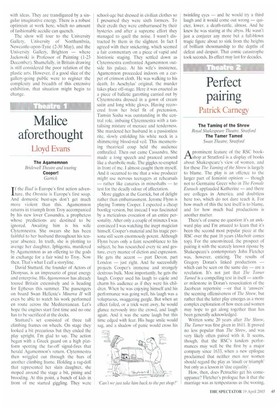Malice aforethought
Lloyd Evans
The Agamemnon Bridei4ell Theatre and touring Cooper! Ganick
Tf the Iliad is Europe's first action advenIture, the Oresteia is Europe's first soap. And domestic bust-ups don't get much more violent than this. Agamemnon returns in triumph from Troy accompanied by his new lover Cassandra, a prophetess whose predictions are destined to be ignored. Awaiting him is his wife Clytemnestra. She swears she has been faithful to her husband throughout his tenyear absence. In truth, she is plotting to avenge her daughter, Iphigenia, murdered by Agamemnon as an offering to the gods in exchange for a fair wind to Troy. Now then. That's what I call a storyline.
David Stuttard, the founder of Actors of Dionysus, is an impresario of great energy and enterprise. His Agamemnon has already toured Britain extensively and is heading for Ephesus this summer. The passengers on board Swan Hellenic's Minerva II will even be able to watch his work performed en route across the Mediterranean. Let's hope the engines start first time and no one has to be sacrificed at the docks.
Stuttard's set consisted of three tall climbing frames on wheels. On stage they looked a bit precarious but they ended the play upright, I'm glad to say. The action began with a Greek guard on a high platform spotting the far-off signal-fires that herald Agamemnon's return. Clytemnestra then wriggled out through the bars of another climbing frame. Holding a rag-doll that represented her slain daughter, she moped around the stage a bit, pining and brooding. At this point, a bunch of kids in front of me started giggling. They were school-age but dressed in civilian clothes so I presumed they were sixth formers. To their credit they were embarrassed by their hysterics and after a supreme effort they managed to quell the noise. I wasn't distracted by them in the slightest. In fact I agreed with their snickering, which seemed a fair commentary on a piece of vapid and histrionic staging. They settled down as Clytemnestra confronted Agamemnon outside his palace. At his wife's insistence, Agamemnon proceeded indoors on a carpet of crimson cloth. He was walking to his death. In Aeschylus' original, the murder takes place off-stage. Here it was enacted as a piece of balletic garotting carried out by Clytemnestra dressed in a gown of cream satin and long white gloves. Having recovered from her brief fit of pretension, Tamsin Sasha was outstanding in the central role. imbuing Clytemnestra with a tantalising mixture of menace and tenderness. She murdered her husband in a passionless rite, slowly enfolding his white neck in a shimmering blood-red veil. This mesmerising theatrical coup held the audience enthralled. Then out came Cassandra. She made a long speech and pranced around like a shambolic mule. The giggles re-erupted in front of me. I almost caught them myself. And it occurred to me that a wise producer might use nervous teenagers at rehearsals — rather like canaries in mineshafts to test for the deadly odour of affectation.
More giggles at the Garrick, but of delight rather than embarrassment. Jerome Flynn is playing Tommy Cooper. I expected a cheap bootleg version, but instead I was fascinated by a meticulous evocation of an entire personality. After only a couple of minutes I was convinced I was watching the inept magician himself. Cooper's material and his tragic persona still seem enormously potent. Although Flynn bears only a faint resemblance to his subject, he has researched every tic and gesture, every nuance of diction and expression. He gets the accent — part Devon, part London — just right. And he successfully projects Cooper's immense and strangely dextrous bulk. Most importantly, be gets the laugh. Cooper used his laugh to cajole and charm his audience as if they were his children. When he was enjoying himself and his performance was going well, his laugh was a voluptuous, swaggering gurgle. But when an effect failed, or a trick went awry, he would glance nervously into the crowd, and laugh again. And it was the same laugh but this time edged with fear. His huge smile would sag, and a shadow of panic would cross his twinkling eyes — and he would try a third laugh and it would come out wrong — quieter, lower, a death-rattle, almost, And he knew he was staring at the abyss. He wasn't just a conjurer any more but a full-blown tragic figure about to sink from the heights of brilliant showmanship to the depths of defeat and despair. That comic catastrophe took seconds. Its effect may last for decades.


































































 Previous page
Previous page